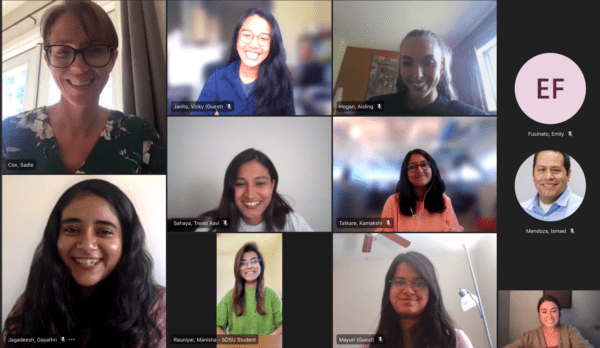Women in Power System Transformation (PST) is a joint initiative from the G-PST Consortium and USAID-NREL Partnership that addresses educational and professional barriers to women’s representation and leadership in the power sector. From June through August 2022, the initiative sponsored the placement of graduate women interns at the National Renewable Energy Laboratory (NREL) and the Electric Power Research Institute (EPRI). The 2022 Women in PST Internship cohort included:
- Kamakshi Tatkare – University of Texas at Austin (NREL)
- Manisha Rauniyar – South Dakota State University (NREL)
- Gayathri Jagadeesh – North Carolina State University (NREL)
- Vicky Janita – Duke University (EPRI)
- Mayuri Choudhury – Arizona State University (EPRI)
- Treisa Ravi Sahaya – University College Dublin (EPRI)
- Aisling Hogan – University College Dublin (EPRI)
Throughout the internships, these young women leaders learned hands-on skills by working closely with NREL and EPRI researchers on cutting-edge power systems analyses and clean energy integration activities. They participated in bi-weekly coffee chats with women professionals and experts in their field. All interns also completed agency-based empowerment training with the Johns Hopkins University Self-Empowerment and Equity for Change (SEE Change) program, along with 33 other participants from power system operators, women’s networks, and technical institutions from around the world. The Women in PST program also collaborated with California Independent System Operator (CAISO)’s fellowship program with the national system operator for Indonesia, PLN, offering fellows the opportunity to participate in the SEE Change training and other Women in PST events. In August, the Women in PST interns presented on their technical work and discussed how their experiences will help them strengthen decision-making and drive development of dynamic energy system solutions.
“It is important to bring gender equity into power system transformation because the rights, responsibilities, and needs should remain fair and same for both male and female. If I face any such situation in my professional or social life, I now feel equipped to integrate gender equity while making any decision or actions,” said NREL intern Manisha Rauniyar, originally from Nepal, in her exit survey.
- Watch the Women in PST interns present their technical work during the program’s virtual poster session.
- Read more about the Women in PST program.

